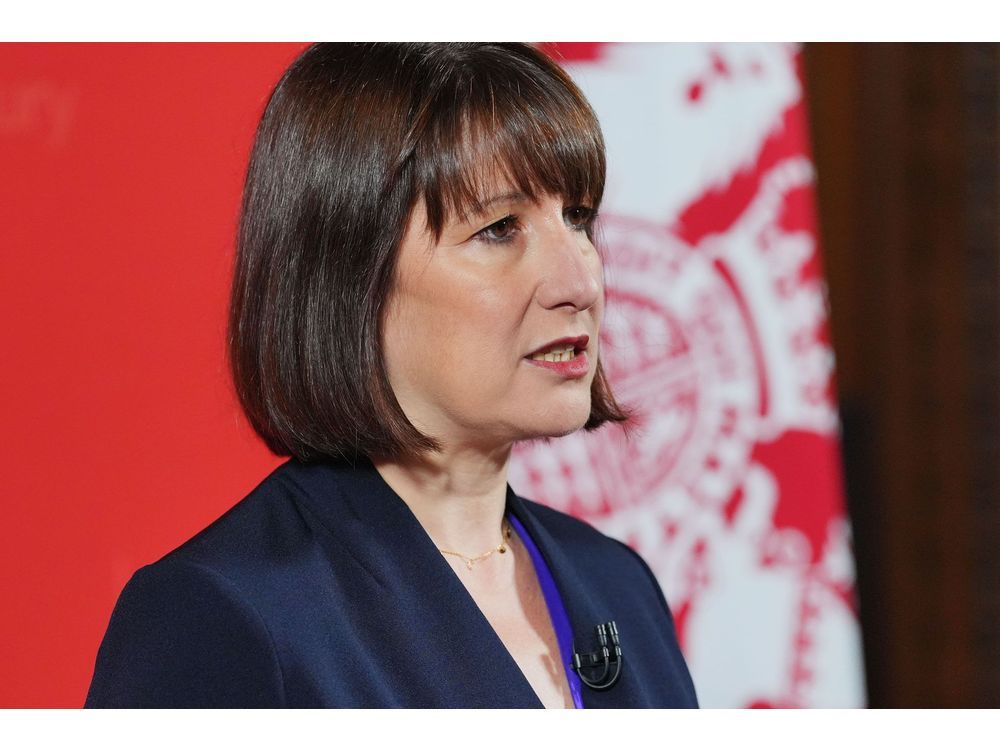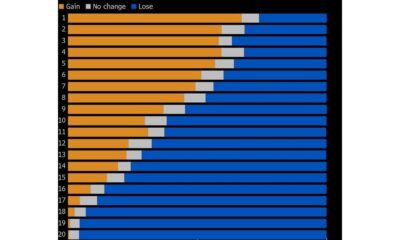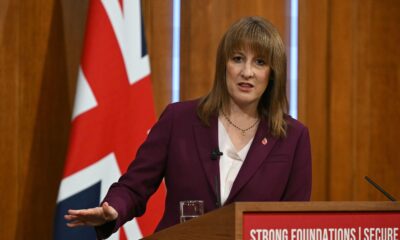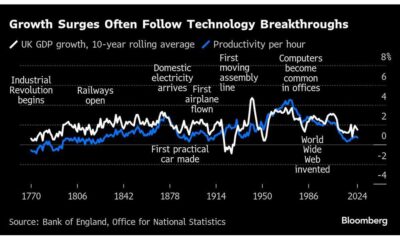Top Stories
UK Borrowing Surges £7.2 Billion Ahead of Critical Budget

UPDATE: New reports confirm that the UK government borrowed an alarming £7.2 billion ($9.6 billion) more than anticipated in the first half of the fiscal year, intensifying the pressure on Chancellor of the Exchequer Rachel Reeves ahead of her vital budget announcement on November 26, 2025. The total budget deficit has now climbed to £99.8 billion, significantly overshooting the £92.6 billion forecast by the Office for Budget Responsibility (OBR).
The situation demands immediate attention as borrowing for September alone reached £20.2 billion, marking the highest monthly figure for that month since the pandemic and the second highest on record. This sharp increase is largely attributed to soaring debt-interest costs, according to the Office for National Statistics.
As the government grapples with these alarming figures, the implications are dire. “Total borrowing in 2025–26 could overshoot the OBR’s full-year forecast by around £10 billion, pushing the deficit to close to 5% of GDP,” warns Martin Beck, chief economist at WPI Strategy. This forecast raises serious concerns for an economy already strained by high employment levels and the lingering effects of recent crises.
The financial landscape is growing increasingly fragile. Higher borrowing costs, controversial reversals on welfare cuts, and a predicted productivity downgrade by the OBR mean that Reeves must identify as much as £35 billion to restore the £9.9 billion fiscal buffer she previously established. This makes the upcoming budget not just a routine financial exercise but a critical juncture for the UK’s economic stability.
This latest data paints a concerning picture just days before the OBR prepares its new forecasts. In fact, the next public finances release is slated for only five days before the budget, heightening the urgency for Reeves to act decisively.
Despite a recent correction that provided Reeves with an additional £2 billion in VAT receipts, overall borrowing levels are still running considerably ahead of both OBR forecasts and last year’s figures. The ONS has attributed part of this shortfall to erroneous VAT data previously reported by HM Revenue and Customs.
In September, the government faced a staggering 66% surge in debt interest payments, soaring to £9.7 billion. This spike was largely driven by a rise in the retail price index in July, which escalated the costs of servicing inflation-linked bonds—currently accounting for roughly a quarter of the UK’s outstanding debt stock.
So far this year, the government has spent £59.5 billion on debt servicing, reflecting an increase of £14.4 billion compared to the same period in 2024. Furthermore, inflation has exacerbated welfare costs, public-sector wages, and spending on goods and services, compounding the financial pressures facing the government.
Tax receipts have also fallen short of expectations, with a deficit of £1.3 billion year-to-date. Local authorities and public corporations have also contributed to the exceeding borrowing forecasts.
As the countdown to the budget continues, all eyes will be on Chancellor Reeves to see how she navigates these turbulent waters. The stakes are incredibly high, and the decisions made in the upcoming budget could have lasting implications for the UK economy and its citizens.
Stay tuned for further updates as this critical situation develops.
-

 Politics4 weeks ago
Politics4 weeks agoSecwepemc First Nation Seeks Aboriginal Title Over Kamloops Area
-

 World5 months ago
World5 months agoScientists Unearth Ancient Antarctic Ice to Unlock Climate Secrets
-

 Entertainment5 months ago
Entertainment5 months agoTrump and McCormick to Announce $70 Billion Energy Investments
-

 Science5 months ago
Science5 months agoFour Astronauts Return to Earth After International Space Station Mission
-

 Lifestyle5 months ago
Lifestyle5 months agoTransLink Launches Food Truck Program to Boost Revenue in Vancouver
-

 Technology3 months ago
Technology3 months agoApple Notes Enhances Functionality with Markdown Support in macOS 26
-

 Lifestyle3 months ago
Lifestyle3 months agoManitoba’s Burger Champion Shines Again Amid Dining Innovations
-

 Top Stories2 months ago
Top Stories2 months agoUrgent Update: Fatal Crash on Highway 99 Claims Life of Pitt Meadows Man
-

 Politics4 months ago
Politics4 months agoUkrainian Tennis Star Elina Svitolina Faces Death Threats Online
-

 Sports5 months ago
Sports5 months agoSearch Underway for Missing Hunter Amid Hokkaido Bear Emergency
-

 Politics5 months ago
Politics5 months agoCarney Engages First Nations Leaders at Development Law Summit
-

 Technology5 months ago
Technology5 months agoFrosthaven Launches Early Access on July 31, 2025





















